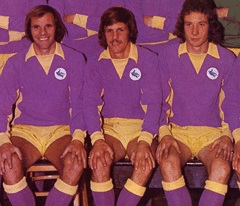Neil Harris’ first game as Cardiff City manager was at Charlton fourteen months ago and he watched his new side recover from 2-0 down to get a point from a 2-2 draw. Tonight, Harris’ successor, Mick McCarthy, had the same experience at his home town, Barnsley as City scored twice in ten second half minutes at a time when they looked certs to equal an unwanted club record by losing a seventh straight game.
So, Alan Durban’s awful 85/86 side, which took City into the old Fourth Division for the first time, do not have the current team to keep them company as holders of a record which sees them consigned to the Cardiff City Hall of Shame and so they shouldn’t! While the last few months have proved the sort of opinions that had us as genuine contenders for promotion before a ball was kicked were over optimistic, the amount of money spent on assembling the squad in terms of transfer fees and wages demands that any equalling of club record losing runs while being a Championship club would represent serious under achievement.
Of course, scraping a draw with a display that offered the new boss plenty of evidence of the substandard basics and lack of creativity that have increasingly driven me to distraction as I try to find different ways of saying the same thing game after game hardly qualifies as a corner turned, but there were at least signs of a return of a couple of Cardiff old dependables – fighting spirit and an attacking dead ball threat.
It should be said as well that an Oakwell pitch which, from memory, didn’t look too bad to me in Barnsley’s televised match with the jacks recently was, by modern day standards, in an awful state – presumably as a result of the snow of the last few days.
So, if the McCarthy era is going to see a return to Cardiff sides playing the beautiful game (don’t laugh!), it was never going to start here and surely it was always going to be that the losing run when it ended would do so with a scrapping, scrappy showing which saw us picking up a point or three that we didn’t really deserve. When you consider Barnsley’s near total dominance of the first half and a second half that we probably just shaded, that was just about what happened tonight – to use an old analogy, Barnsley would probably have won on points if it were a boxing match.
In his pre game media video conference, our new manager indicated that Max Watters had a problem with his Achilles’ tendon which could rule him out and it duly did, but, otherwise, it was a clean bill of health for his squad- this, apparently, was not the case though.
Maybe Sean Morrison’s presence on the bench was not too much of a surprise given he’d only just returned from injury, but very few would have foreseen the omission of Harry Wilson (the Welsh international was not used off the bench either and McCarthy’s answer to post match questions about his decision met with a pretty curt response about him picking the team based on what he had seen in the two days training he had taken). Marlon Pack did not return to the line up either as no one got the starting eleven right in the pre game pick the team thread on the messageboard I use.
Maybe the inclusion of Aden Flint for the first time this season was predictable given that Mick McCarthy had told the local media in Ipswich what a thorn in the flesh Flint had been at both ends of the pitch when they played Bristol City during the manager’s time there , but Joel Bagan starting was a surprise with neither Greg Cunningham and Joe Bennett picked even as substitutes.
Presumably Bennett was injured, but with both senior left backs out of contract this summer there is the possibility that one or both of them could be leaving before the transfer window closes (there was a post match confirmation from the manager that Cunningham was joining Preston on loan, so, the likelihood is that he has played his last game for City)..
Finally when it comes to Mick McCarthy’s first squad selection, it was good to see another Academy product breaking into the senior ranks with striker Isaak Davies named as one of the substitutes.
With many supporters predicting a start for Josh Murphy, it was Sheri Ojo who was given one of the wing births with Junior Hoilett on the other flank, but the Canadian international’s first contribution on five minutes was to begin a sequence of errors by men in blue as comic cuts defending saw Cauley Woodrow bundle the ball into the net, possibly with a touch from Flint to help it on its way in. It really was dreadful defending which certainly didn’t deserve the good luck we got as referee Andy Woolmer disallowed the goal for reasons that weren’t clear to me.
City weren’t so lucky a quarter of an hour later when, just as against QPR last week, they fell asleep from a throw in as the home side surprised them by not throwing the ball long and Dominik Frieser was given plenty of time to cross to unmarked centre back Mads Andersen who nodded in powerfully from ten yards out – the fact Andersen did not have to jump to meet the ball only emphasised further City’s shoddiness.
Woodrow should really have made it two just before half time, but shot over from close range. However, given Barnsley’s control of the game, it didn’t seem that this would be an expensive miss by the home team – City hadn’t really done anything to suggest they had an equaliser in them in what was very much a late Harrisesque first half showing.
McCarthy’s frustration with his side could be judged by his decision to introduce Murphy for Hoilett with the second period barely started, but things took a decided turn for the worse when Woodrow got above Bagan to head home a Nicky Mowatt free kick from out on the touchline as City once again showed that their good set piece defending of recent years is a thing of the past.
Although City were making a better fist of it in the second half, there was no sign of a way back into things for them until they scored a goal out of the blue when Ojo touched in a mishit cross shot by Murphy on fifty eight minutes as the home side struggled to deal with a corner.
City stepped up their pressure for ten minutes after that as they enjoyed their best spell of the ninety minutes without looking overly dangerous, but, once again a corner kick proved pivotal to the outcome – it all looked so easy as Ralls swung in the corner from the right and Keiffer Moore rose on the far post to nod in from eight yards after home keeper Bradley Collins came for, but got nowhere near the cross.
The momentum was now with City and, ordinarily, it would have been disappointing that they didn’t really kick on from here and step up the pressure on a shaky home team, but, given what has happened to them over the past month or so, I suppose it was understandable that they appeared to be more concerned with holding on to their point than looking to try to turn it into three.
As it was, Barnsley came closest to getting a winner in the time that remained with Victor Adeboyejo and Callum Styles unable to convert what were decent chances.
Ir would be daft to expect Mick McCarthy to have an instant impact given how far confidence must have fallen recently and what the new manager got was a full breakdown of the squad’s weaknesses, some of which have been staples in Cardiff teams for years, but, as mentioned earlier, also a glimpse of some of their strengths.
Two more set piece goals emphasized that most teams would love to be as good at scoring from them as we have been for some time now, but they would probably say “nah, we won’t bother” if gaining our set piece threat meant that they also had to inherit our “ability” to create chances from open play.
Finally, it’s now less than two months to the fiftieth anniversary of our win over Real Madrid in the European Cup Winners Cup Quarter Final First Leg in March 1971. To commemorate that anniversary, I’ve written a book called Real Madrid and all that – details of which can be found below.





